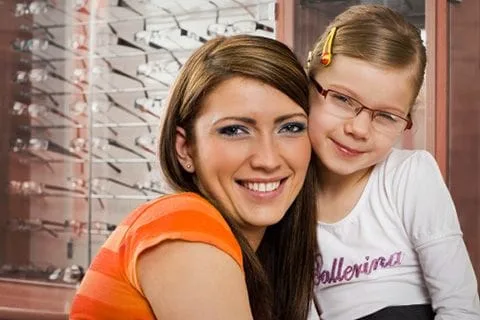Did you know that approximately 1 in 12 preschool-aged children need glasses to correct a vision or eye teaming disorder? At La Grande Family Eye Care, our optometrists firmly believe in the value of early intervention and regular comprehensive examinations for children.
When should my child receive his or her first eye exam?
This may surprise you, but most pediatric eye doctors recommend that a child’s first eye examination occur between 6 months and 1 year of age. Early intervention is crucial to preventing or treating the most common cause of childhood vision loss, a disorder called amblyopia. Children with amblyopia often see well out of one eye, while the other struggles to achieve good vision. Left unchecked, amblyopia often becomes permanent, and is most responsive to treatment within the first few years of life. By the time a child encounters their first vision screening in school, the best window of opportunity for treatment may have already passed.
While we believe that all children should receive a comprehensive eye exam in infancy, certain risk factors increase the likelihood that vision disorders will be present. These include:
· Premature birth or low birth weight
· Family history of vision disorders or eye turn
· Family history of early cataracts or eye cancers
· Maternal exposure to infectious diseases such as toxoplasmosis or rubella
· Neurological disorders or other diseases with possible ocular implications
· Use of medications with ocular side effects
At what intervals should my child have their eyes examined?
The American Optometric Association recommends that children have a comprehensive eye examination between 6 mo and 1 yr of age, another between 3 and 5 years of age, and annually between 6 and 18 years of age. Children grow and develop quickly, and so do their eyes! Myopia tends to develop during adolescent and teenage years, resulting in nearly 1 in 10 children 12 to 18 having a visual impairment. Because vision is so critical to learning and education, children should be seen at regular intervals to monitor visual function and eye health.
…But my child already had a vision screening with the pediatrician or at school. Doesn’t that mean everything is OK?
Absolutely not. While vision screenings provide a valuable service to our community and allow the identification of some children with eye disorders, they are in no way equivalent to a professional eye examination. In fact, the most common vision problem associated with difficulty in learning and school performance (hyperopia or farsightedness) goes largely undetected by most vision screenings. For this reason, several states have passed laws requiring that children receive a professional eye examination before beginning school. Far too many children with meaningful vision disorders have “passed” every school vision screening they were subjected to. Undetected, these problems often delay or inhibit a child’s ability to learn at school, since approximately 80% of learning occurs through visual processes.
I’m not sure if my child has insurance coverage for an examination.
With the passage of the Affordable Care Act, nearly all medical insurance covers eye examinations for children. If you lack insurance coverage and cannot afford care for your child, we participate in the InfantSEE program which offers a free comprehensive exam for infants up to one year of age. We also participate in Sight for Students and other programs which offer free eyecare to children in need. Call us and we can help!
How can I prepare my child for their first eye exam?
We have a lot of fun during our eye exams with kids, so that most children look forward to seeing us for their examinations. Our clinic, equipment, and doctors and staff are all are child friendly. However, it is best to schedule a younger child’s exam during a time of day when they are alert and not hungry or irritable. Nap time is not a good time for an eye exam! For best results, parents may also practice using eye drops with their child (general artificial tears or a saline eye wash are safe) to prepare them for having their eyes dilated.

